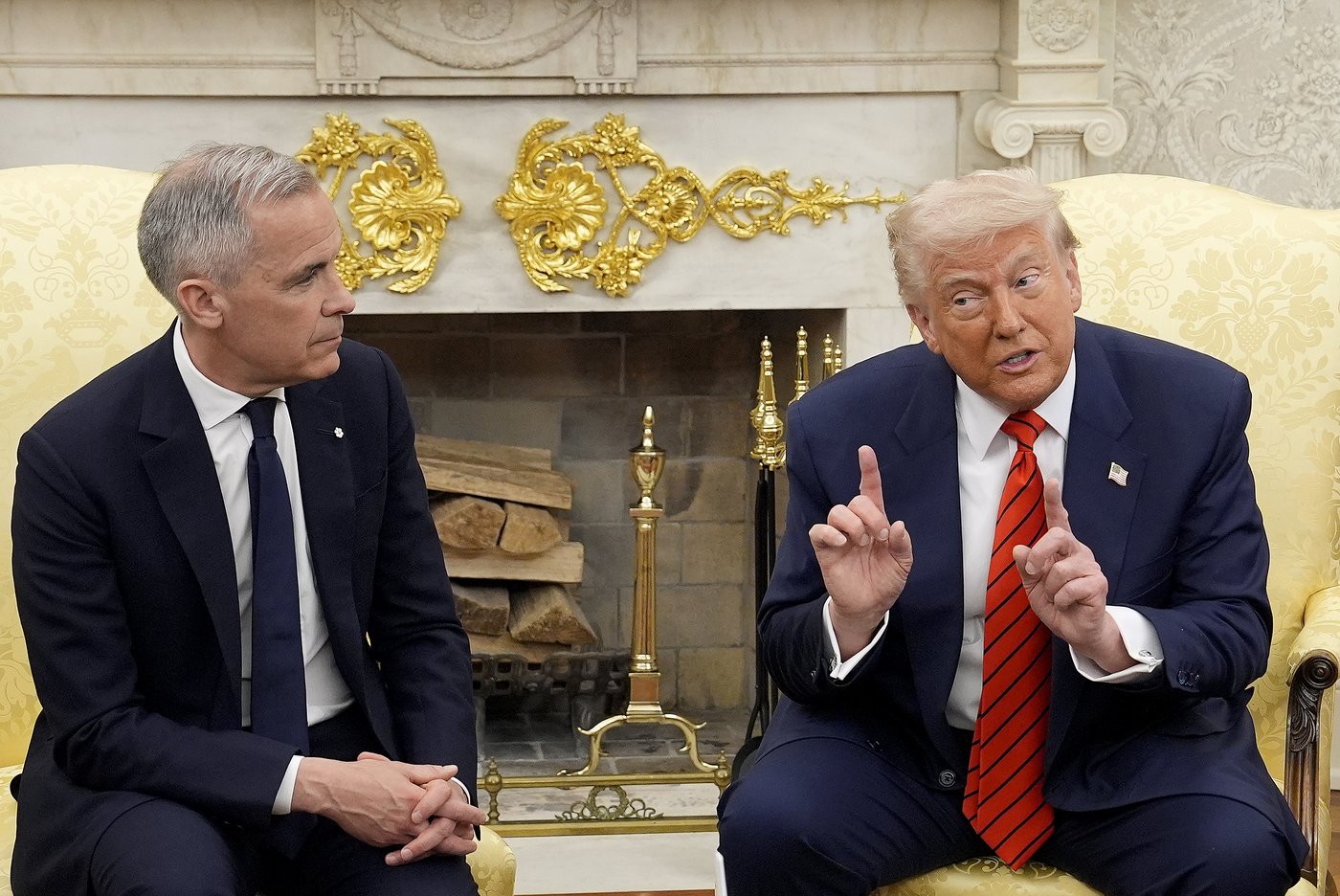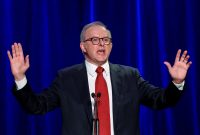OTTAWA — Canada’s premiers and Prime Minister Mark Carney will meet in Saskatoon on June 2 to discuss ways to work together to make the country stronger.
Carney stated in a social media post that amid “pressing trade challenges,” his focus along with the premiers is on enhancing Canada’s economic strength and resilience.
This involves initiating large-scale national development initiatives, eliminating domestic trade obstacles, and fostering a unified Canadian economy,” Carney stated, noting that the gathering in Saskatoon would “continue this progress.
On Wednesday, Carney updated the premiers during a conversation about his initial meeting with U.S. President Donald Trump at the White House, as Canada faces an onslaught of American trade tariffs.
Ontario Premier Doug Ford, who joined the conference call, mentioned that the premiers applauded the prime minister for his recent electoral win as well as the “calmness” demonstrated during his discussion with Trump on Tuesday.
“I doubt I would’ve shown as much self-control as he did yesterday, to be completely honest,” stated Ford. “It’s a positive beginning for a new partnership. Everyone seems quite pleased with how the meeting went yesterday, so that’s certainly encouraging.”
The Saskatchewan Premier, Scott Moe, expressed his satisfaction to journalists in Regina after meeting with Carney and the other premiers. He also conveyed his pleasure regarding how Carney’s discussion with Trump had proceeded.
Moe added he’s looking forward to robust conversations with Carney and the other premiers in Saskatoon.
“(There will be) some good discussion on how we can really bring Canadians together in light of a fairly divisive election and a fairly divisive time,” he said. “There is some definite change in existing policies that need to happen in order for us to legitimately restart the relationship that we have (with Ottawa).”
The Prime Minister’s Office stated in a press release that the “fruitful” conversation held on Wednesday centered around the Canada-U.S. relationship and bolstering Canada’s resilience domestically.
The PMO stated that the premiers concurred with speeding up project approvals, incorporating a ‘single project, single review’ process. The Prime Minister restated his pledge to introduce federal legislation aimed at eliminating interprovincial trade barriers before July 1st.
New Brunswick Premier Susan Holt said in a social media post Wednesday that premiers shared their top priorities for nation-building projects.
She stated that the ports of New Brunswick are prepared to boost both domestic and global commerce through further investment, adding that the province boasts initiatives which are “poised to advance critical mineral ventures aimed at fostering economic growth.”
Holt stated that New Brunswick stands out as a pioneer in modular home construction and is “poised to leverage investments to address the nationwide housing shortage.”
Carney briefed the first ministers after Alberta Premier Danielle Smith publicly raised the prospect of her province separating from Canada.
Last week, Smith’s United Conservative government introduced legislation that would sharply lower the bar petitioners need to meet to trigger a provincial referendum on secession.
Ford said Carney did “a really good job” of reaching out to Western Canada and that he told the prime minister it’s time his government started “showing some love” to Saskatchewan and Alberta.
“The last prime minister showed no love,” Ford said. “So it’s nice that we’re heading out there to Saskatchewan for (a first ministers) meeting.”
When asked about Smith’s referendum legislation during a press conference in Washington on Tuesday, Carney said Canada is stronger when the provinces work together.
“As an Albertan, I firmly believe that,” he said. “You can always ask a question, but I know what I would respond clearly.”
On Tuesday, Ford criticized talk of Alberta separating and said Canada must be united in its fight against the United States.
“This is a time to unite the country, not people saying, ‘Oh, I’m leaving the country,'” he said.
When asked on Wednesday whether any premiers warned Smith during the conference call regarding the timing of a referendum, considering discussions from the White House about potentially annexing Canada, Ford stated, “nobody mentioned that,” though he acknowledged it could come up in a “private discussion.”
Ford was additionally questioned about whether federal Conservative leader Pierre Poilievre requested a meeting with him. He mentioned that he believes Poilievre “sought meetings with everybody nationwide.”
“I have no problem with that, and I’d be more than happy to talk to anyone and work with anyone,” Ford said.
Carney and Trump spent about two hours together Tuesday at the White House, including about half an hour in front of the cameras in the Oval Office.
It was their first face-to-face discussion of U.S.-Canada relations and Trump’s ongoing trade war.
Manitoba Premier Wab Kinew sent Carney a letter Wednesday pitching federal-provincial partnership on several nation-building projects.
They include creating a trade corridor through the Port of Churchill, establishing Indigenous “fair trade zones” and developing critical minerals infrastructure. In his letter, Kinew called his province “the Costco of critical minerals.”
Kinew said Manitoba “stands ready to collaborate” with the prime minister and other provinces and territories to “build a stronger Canada on projects of national interest.”
In question period Wednesday, Kinew responded to a question about what he’s doing to protect the province’s film industry from U.S. tariffs.
He said Carney and the premiers “have to protect industries across the board, but including those that generate intellectual property.”
B.C. Premier David Eby said after the meeting Wednesday that the premiers agreed Carney succeeded in setting the tone for “a new relationship” between Canada and the U.S. He said the premiers were all “grateful” that the meeting went the way it did, given how recent sessions with other world leaders have unfolded in the Oval Office.
Eby also said British Columbians are “all in” for Canada and that this is the moment to stand together as a country.
“The idea of separating here is a non-starter,” Eby said, adding that he encourages premiers to work together to hold the country together and push back against any separatist movement.
Carney said he and Trump agreed to talk further in the coming weeks and will meet in person again when the prime minister hosts the G7 leaders at a summit in Alberta from June 15 to 17.
“Really, today marked the end of the beginning of a process of the United States and Canada redefining that relationship of working together,” Carney said.
The issue at hand is how we will collaborate moving forward. How we can establish an economic and security partnership grounded in mutual respect, founded on shared interests, which provides transformative advantages to our economies.
Fen Hampson, a professor at Carleton University and co-chair of an expert panel on Canada-U.S. relations, stated that Carney needs to handle two parallel sets of discussions with the United States.
Initially, he must tackle upcoming discussions regarding the Canada–United States–Mexico Agreement (CUSMA). While this accord is set for review in 2026, Trump has expressed his desire to reopen talks earlier than planned.
Hampson mentioned that there is also the more pressing task of convincing Washington to remove the newly implemented tariffs on Canadian goods.
“This is the top priority for today since I believe both he and our administration recognize that it’s not possible to renegotiate a trade deal while the Americans effectively cripple the agreement through such severe punitive tariffs,” he stated.
Although Trump stated on Tuesday that no statement from Carney would convince him to remove the tariffs right away, Hampson indicated that the president has the propensity to alter his stance.
He mentioned that this scenario has been observed numerous times previously,” he stated. “This includes situations involving tariffs; they were introduced but subsequently reduced or postponed.
Favorably for Canada, Hampson noted, is the situation where the American economy is poised to decline due to tariffs levied against Canada and other nations like China. The difficulty will lie in making Trump comprehend the significance of Canada’s marketplace, he further mentioned.
Carney is anticipated to announce a new cabinet next week, prior to Parliament reconvening at the end of the month.
Hampson indicated that he believes the prime minister plans to make alterations to his inner circle, and he’ll need to select individuals who are “strong and skilled at negotiations.”
“As he looks to potential cabinet appointments, he really needs to look at them not just in terms of their management and ministerial skills, but in terms of their negotiating skills because they’re going to have to do some of the negotiating.”
— With files from Allison Jones in Toronto, Jeremy Simes in Regina and Steve Lambert in Winnipeg
This report by The Canadian Press was first published May 7, 2025.
Catherine Morrison, The Canadian Press







